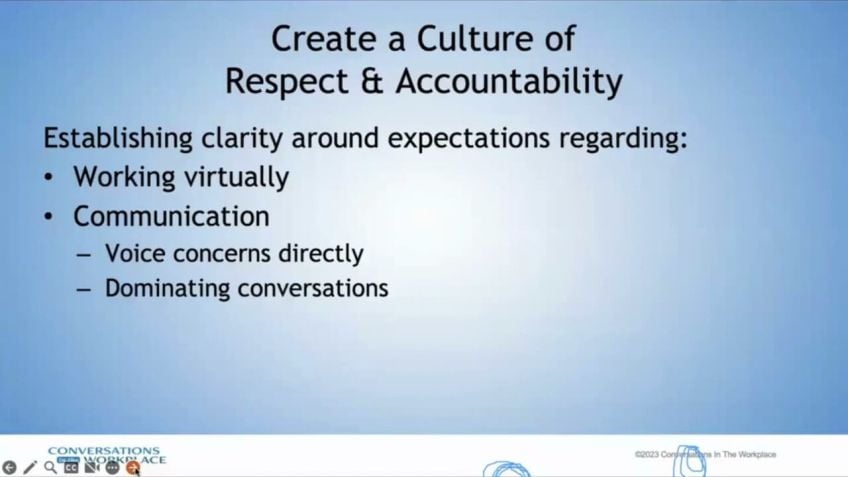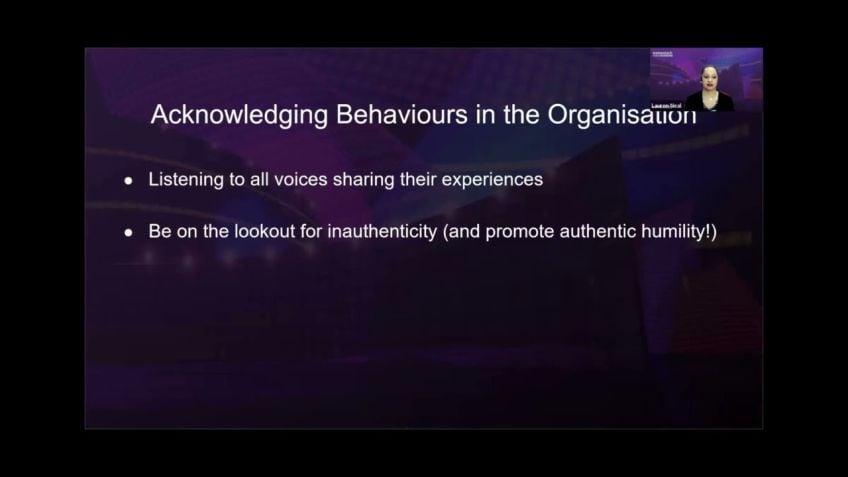How to be successful in a toxic environment
Understanding and Navigating Toxic Work Environments
Hello everyone, Shama Ker here, co-founder and CTO of Nicolette and TestEngineering Director for Aspiration. I'm thrilled to be sharing with you today my insights on dealing with toxic work environments and how to thrive despite these challenges.
Definition and Indicators of a Toxic Environment
A toxic workplace can be described as an environment that negatively impacts your morale, mental health, overall health, and even family wellbeing. Recognizing these situations early on will greatly assist in managing them, ensuring these factors do not consume you.
Let's delve into some of the key signs that indicate an unhealthy working environment:
- Narcissism: Lack of empathetic leadership, emotional outbursts during meetings, and unrealistic expectations.
- Poor Communication: Lack of interaction, transparency, or the presence of fear towards sharing information.
- Resistance to Change: An environment that inhibits innovation and has a deep-seated fear of failure.
Action Steps in a Toxic Workplace
Observing these signs in your workplace could indicate unhealthy and toxic conditions. Here are steps to consider when faced with such circumstances:
- Confidence: Confidence in your skills, knowledge, and expertise are key to managing toxic situations. The manipulation tactics often used in toxic workplaces are rendered ineffective when you root your actions in confidence, believing in your abilities and ideas.
- Speaking Up: When faced with negativity in the workplace, it's crucial to voice your concerns and protect your interests. It's all about standing up for yourself, asserting your rights, and making sure you're heard.
- Fearlessness: Responding fearlessly to challenges is a key attribute for navigating toxic workplaces. This includes maintaining calm under pressure and not succumbing to fear.
- Document and Use Data: The importance of documentation cannot be overstated. Precise documentation helps provide evidence when discussing issues within your workplace or when you need to bring up concerns to your superiors.
Transforming Toxic Environments
Now, let's consider some strategies that each one of us can use or encourage within our workplaces to foster a positive and healthy working environment:
- Workplace Training: This can cover a wide range of topics from conflict management, underlining the importance of diversity and inclusion, improving communication and fostering relationship-building skills.
- Open-Door Policy: Encourage an open dialogue within your organization. Communication is crucial for fostering a healthy and vibrant workplace culture.
- Accountability: Everyone in the workplace should be held accountable for their actions. Supporting each other and taking responsibility for actions and decisions fosters trust and helps build a more harmonious workplace.
Creating a workplace culture that cultivates positive, encouraging, and productive conversations helps in building a safe environment for everyone. A space that safeguards the mental and emotional wellness of its employees can lead to higher job satisfaction, better reinforcement of values and overall company growth.
Remember, dealing with a toxic work environment is not a singular battle, but rather a collective effort. With the right culture, policies, and support from all levels of the organization, we can transform these toxic environments into a nurturing and freeing space for everyone.
Have any Questions or Want to Share Your Story?
If you have any questions or if you want to share an experience, please do. There's a lot we can learn from each other's experiences. If you feel that you're in a toxic situation and in need of advice, don't hesitate to reach out. We're all in this together.
Always remember, your mental health and sanity are paramount. Never hesitate to seek help or take necessary actions when you find yourself in an unhealthy situation. Thank you for your time and attention.
Video Transcription
Morning. Hi, everyone. This is Shama Ker. I'm a co-founder and CTO at Nicolette. Uh it's a out of home advertising company uh that we launched in 2019. And uh I'm also working as a test engineering director for a, you know, a financial tech services company called Aspiration.
I'm excited to be part of women tech uh and happy to, you know, like uh go over um you know, like the what, what, what it means, you know, like a toxic environment, how to shine and what are the strategies, you know, to, you know, like, take to transform the uh toxic environment if you know your organization or if you are, you know, experiencing in your company or with a specific pr or you know, any of your reporting.
So let's get started. Um Hopefully this works. Ok, perfect. Yeah. Um One of my, you know, like uh recommended, you know, like book on toxic environment is basically raising about a toxic workplace, which is, you know, by Gary Chapman. There are a couple of uh you know, like quotes uh which, you know, I live by and I'm sharing here with you. So let's first take a step back and understand what a toxic uh toxic environment means. Basically any, you know, like any workplace or any, you know, like um situation you're in where your morale is, you know, like brought down or um it impacts your mental health or your overall health or your, or your, your family's, you know, well-being um in, you know, like in any, you know, negative or adversely, that means you are in, you know, like, um you know, like unhealthy um situation, unhealthy workplace or organization or company and what are the steps that you need to, you know, like, um you know, take, so let's first, you know, identify what are the subtle signs uh or key, you know, like signs that could help you understand that, hey, this is really an unhealthy environment uh that, you know, like, uh you know, uh we are in, there are few signs um of, you know, like, uh you know, unhealthy environment um as we all know, bullying abuse threats, any, you know, like, um uh sort of, you know, like, uh sick call outs.
All of these are, you know, like signs uh which, you know, are very prominent but bes besides this, there are key um you know, signs uh which, you know, like pro uh you know, helps us understand that, hey, you know, this situation or this specific, you know, event or this specific, you know, like, uh discussion is, you know, turning into an unhealthy or, you know, like um toxic sort of, you know, like, um you know, situation narcissism is the first one.
Basically narcissism is more like a uh when there is, you know, lack of empathetic leadership, I come from, you know, like a very empathetic uh leadership background where I learned, you know, at Google and linkedin. Uh So definitely, you know, like, I'm very, you know, pro and a pro proponent of having a compassionate, empathetic leadership. But when you, you know, like see that um missing um or you uh you are in, you know, like meetings where emotional outbursts are happening, people are yelling or screaming or, you know, like, uh you know, things are going out of control, you know, that, hey, this is, you know, unhealthy environment and this is where you either, you know, need to just, you know, go away from it, uh take a, you know, deep breath uh before you, you know, like sort of come back having unrealistic expectations, uh no clarity.
Uh This is, you know, something that another, you know, sign where uh uh usually, you know, good managers, they will set, you know, bar high, they will, you know, like help, you know, put, you know, stretch goals to explore teams, uh uh you know, like, uh uh uh you know, reach, you know, certain height then uh basically support uh throughout, you know, their journey.
Um um And, you know, like, uh good managers but on the other hand, uh when you face, you know, large workloads, when you see, you know, pressure filled, you know, like deadlines, unrealistic, you know, goals with, you know, no clarity, uh objectives and key results have no clarity.
Definitely there is, you know, like no work life balance, you know that, hey, this is, you know, like one of, you know, the sign uh for, you know, like unhealthy or um you know, like a toxic, you know, like environment poor communication with no transparency. You might see employees not, you know, like uh formally interacting with each other, not, you know, speaking, you know, like, um not joking around, not smiling. Um They are, you know, sort of holding the information out of, you know, fear. Uh they are not, you know, like being transparent. Um That's, you know, another, you know, like sign um all of these sort of, you know, like contributes to unsafe, you know, environment where gossip happens, like in a group of people, you know, gossip about a situation or um uh there is, you know, like, uh you know, like situation of uh in, you know, like uh where, you know, retaliation, you know, happens.
People fear that, hey, you know, if I speak up, um uh you know, things might get retaliated against me and I might um you know, lose my job. So it's, it, it's sort of, you know, like an environment where um you don't have you know, like, um ability to speak up or voice your concerns because of, you know, like unknown fears, retaliation. And uh that's, you know, another sign, um then resistance to take, you know, like chance, um world is, you know, moving towards innovation. And um we all want to, you know, like take, you know, uh calculated risk, uh invest in innovation, learn from, you know, any of the failure or the mistakes that we make. And we want, uh you know, companies, our leaders, our, you know, managers, our, you know, peers to sort of, you know, like um adopt uh you know, uh equally, you know, like, um uh you know, uh sharing the shoulder with us to take chances um and not have, you know, fear of failures.
But if you see, you know, like your company is not, you know, or your workplace is not, you know, like uh investing into innovation, they have, you know, fear of failures or the, the or the same mistakes are sort of repeating, you know, that, hey, you know, like this is sort of um an environment that you, you know, want to take, you know, like sort uh you know, steps to change or transform.
So these are, you know, some of the signs there are, you know, many different, you know, like signs uh that could um imply that, hey, this is, you know, like uh an unhealthy environment that we are um you know, like in and here are, you know, like steps that you could, you know, take um uh to sort of, you know, help yourself, protect yourself, take care of yourself in a toxic, you know, uh situation or an environment or in a workplace.
We spend so much of li uh work of, you know, life like, you know, so many hours at work um in person or nowadays, you know, new, no remote work. It's incredibly important that we feel, you know, comfort, comfortable in, you know, like um uh in, you know, like at our workplace uh with our peers with, you know, any meeting. So one of the, you know, like most important thing to, you know, like shine is, is, is, you know, being confident and uh being confident means, you know, like being, you know, like believing in yourself um no matter, you know, like um what, you know, like the situation is as long as you believe in yourself.
Definitely, um you know that, hey, you know, the people who are very manipulative will not be able to, you know, manipulate. Um uh you uh because hey, you believe in your yourself, you are confident about her that, hey, what I'm, you know, like recommending or suggesting or the action I'm taking, I believe in those actions, even if, you know, I feel I'm ready to uh be, you know, vocally, self critical and, you know, learn from MS D.
So definitely confidence is one you know, aspect that, uh you can, you know, like inbuilt and um uh use as, you know, one of your, you know, like huge, you know, strength to uh tackle uh any of, you know, this kind of unhealthy, you know, environment or situation speaking up and standing for yourself.
Um I was one of the only female at times within, you know, like 10 people or 12 people, uh leadership team. So, uh getting hurt was, you know, like a challenge that I myself have faced. Uh but I find my ways to get out of that. Speaking of standing for yourself, voicing your, you know, like concern voicing your opinion is equally, you know, important. And one of, you know, like the um step that I would highly recommend to, you know, deal with any sort of unhealthy or toxic, you know, like situation is to speak up and uh follow through um with, you know, either documentation or any sort of data to help yourself. Um you know, like, protect yourself being fearless. This is, you know, one of the uh leadership sort of, you know, like principle that I myself learned uh throughout my career. So I have, you know, like, um uh whether, you know, like, um I'll share, you know, one funny incident uh that happened and how I learned to be, you know, like fearless leader is basically a while ago when I was uh working with linkedin, it was uh long back in 2009. And, um, I was very new. I had never seen, you know, the CEO of the company and one fine day when I parked back, um, into, you know, like, uh, regular, you know, parking area, I was, you know, opening with my badge, opening the door.
Suddenly a person came, you know, running behind me and wanted to, you know, get in his badge was invisible. I asked, I stopped that person and made sure to see the badge. Of course, I was, you know, like, um you know, I was profusely uh speechless and I apologize many times. But my, you know, like CEO uh you know, consolidated and said, hey, you are doing, you know, the right thing. This is how I started building, you know, a fearless uh you know, like leadership. Another aspect of fear, like fear, being fearless is in this situation remaining calm, um controlling um your, you know, like keeping your head cool, controlling your um uh you know, like voice and um even if you are, you know, under tremendous pressure, keeping cool is these are, you know, some of the, you know, area uh you know, like uh uh you know, things that help me uh deal with, you know, any of, you know, toxic, you know, situation that I was ever in documentation, we all believe in documentation, use of data.
Um So document, document, document, I would, you know, highly recommend uh if you, you know, you're sort of, you know, like discussing um following through with uh any of your pr uh definitely, you know, document that if you're attending a meeting and you feel that hey, you are in this, you know, like sort of unhealthy, you know, like situation, document, the meeting notes, document action items, um clear, precise documentation, use of data is definitely going to help you, you know, shine in, in the, you know, to environment because that's going to give you a boost.
Um uh That, hey, you have data, you have evidences you have noted down toxic, you know, behavior, you know, like examples and um uh you can use this data or documentation when you're talking to either your, you know, like a friend of a sympathetic, you know, like Ali or your mentor or, you know, definitely um at the end, you may want to, you know, get, you know, engage with hr depending on what, you know, like situation you are in.
Um But these are some of, you know, the steps that I myself have, you know, like used um a lot of times in, you know, whenever I have found myself in an unhealthy, you know, situation or a meeting or, you know, um discussions, any, you know, questions so far, let me just check.
OK. Um There are a few strategies uh that I myself have, you know, like I'm, you know, making sure to, since I have you know, my own company, Nicola Di, we are making sure that hey, we are not, you know, creating a toxic, you know, like uh work culture ensuring. So these are some of the strategies that, you know, I'm sharing from my experience is trainings um workplace trainings. Um So uh basically developing, you know, having the right policies, uh the trainings like conflict resolution, you know, management crucial, you know, conversations.
Um some of some other trainings like um some of, you know, other example is, you know, diversity and diversity and inclusion, which is, you know, like really, you know, huge uh thing nowadays, you know, each and every company is investing into. So having those training will help employees and um everyone including leaders, company leaders, organizational leaders, employees to know what it, what, what it means to be, you know, like uh you know, a toxic, you know, like uh you know, like pr or, you know, situation and how do we, you know, sort of, you know, like take, you know, uh opportunities to solve and transform uh uh either, you know, like the workplace, the organization or the company depend on, you know, the company size.
But training is something that, you know, like uh high I would highly, you know, like recommend we have, you know, a lot of different, you know, trainings within, you know, Nicola that helps our employees understand, you know, uh different, different aspects of, you know, leadership, different different aspects of management and being, you know, like, um you know, successful open door ballet policy.
I started my career with Google, which had, you know, like open door policy. Definitely, that is something that I have seen, you know, a lot of benefits of that um encourage, I would, you know, highly encourage any um you know, like if you're starting your own company or if you're in, you know, like the company and if you know, you don't have open door policy, definitely, you know, talk to your, you know, pr manager hr whoever, but I would encourage having the open door, you know, like open dialogue between, you know, company, you know, executives as well as its employees, whether it's in terms of, you know, like growth revenue or sharing, you know, like the new initiatives, um people should be able to, you know, voice their, you know, like opinion and that they should see that the opinion is getting valued, that's how you will create, you know, like the open door policy.
Um Other um other, you know, like recommendation on this is, you know, creating an environment uh where people can um you know, speak up about ideas. Everyone has, you know, like a lot of, you know, great ideas at Google. There was, you know, like um ideas, you know, database where we could, you know, enter, you know, like a lot of ideas and some of those ideas we have seen that uh a lot of, you know, good products came out of that. So definitely that's, you know, part of open policy where uh having, you know, like a structure or, you know, like a good, you know approach uh for encouraging our employers or our peers or anybody, our report is our, you know, like executives to come up with ideas and then uh that benefits, you know, to the company or, you know, any a any way cultural uh perspective, business perspective, product perspective, technology perspective, definitely, you know, that those are, you know, some of the aspects of uh open door policy.
Accountability is the next one which is, you know, I personally believe in uh accountability responsibility holding, you know, like, uh you know, uh people, you know, accountable. Um uh if you are, you know, committing to something, follow through the commitment. Um If uh uh you know, leaders should uh execute on, you know, like actions. If you have an open door policy, you will get a lot of, you know, open and honest feedback that you can action on make those actions, you know, account of, you know, visible to your employees and show them that, hey, how you are holding yourself accountable be, you know, like, um you like um a leader who holds, you know, like yourself, you know, oneself, you know, accountable uh people uh usually, you know, like, follow um uh follow through uh and cultivate, you know, like similar you know, approach.
So led by example is, you know, goes with, you know, accountability and all of these, you know, trainings over the policy, accountability, commitments, ownership, all of these, you know, uh sort of uh contributes to having a safe environment. So the way to create safe environment is to, you know, like having a lot of, you know, like um you know, uh changes made in terms of how you, you know, like communicate, what kind of, you know, like trainings uh infrastructure you have, how you are, you know, holding yourself accountable as well as your peer equally accountable.
And um having a safe environment will help uh result into employee retention and um uh getting, you know, like good, you know, rewards and recognition programs, employee will feel, you know, safe to, uh they will think about, you know, this is your, their own company, they will go above and beyond the growth will, you know, like you will see, you know, a lot of, you know, positive impact on, you know, overall growth of the company.
So having a safe environment where people are not fearful of retaliation and they can, you know, like speak about whatever they want. Um is, you know, like, uh uh will boost uh overall improving uh your, you know, like, uh you know, organization's health, your company, health or your, you know, overall workplace health. So these are some of, you know, like the uh strategies that you know, like I would like to, you know, share with all of you and, uh, and that's pretty much it, uh, about, you know, like since it was, you know, 20 minute session just wanted to make sure that, hey, you know, I try to get as much information as I can within, you know, 20 minutes and keep, you know, good amount of time for any question and answers.
Ok, so we are going, getting into your question and answers. Um Anybody want to, you know, ask any question or share any story, please go ahead. Yes, I, I'm just looking at some of, you know, like the uh you know, messages on the chat. Yes, I would agree that, hey, um at times for your mental sanity don't even, you know, like walk if you are in, you know, like, um really, you know, like, um you know, what situation and you have, you know, tried everything that you could to transform the situation, you might want to, you know, like leave or run away and, you know, like, uh for your own, you know, like health and uh mental, you know, sanity.
Um Yes, there are, you know, a couple of examples I could have, you know, definitely in uh included in my uh presentation. Oprah is a great example. Uh There are, you know, a couple of additional examples uh that, you know, like Gary Chapman has uh you know, included in his, you know, book one of the example is of a well known successful teacher where a teacher was, you know, taking underprivileged, you know, like students and uh investing into them to uh make them successful.
But when a new principal joined uh that principal had some, you know, like concerns and the principal was, you know, like more of a toxic personality and how this uh school teacher still continued to thrive even in the toxic, you know, like environment and continue to make, you know, positive impact on students life.
That's, you know, like a really admire a admirable, you know, story um that is, you know, mentioned in the, you know, in that book. Uh Definitely, I would, you know, recommend reading that. All right, if no questions, I'm at time, uh this, you know, like session will be shared. Uh my slides, I will definitely make sure to share these slides uh with everyone. Um So, yeah, that's about it. Thank you everyone.





